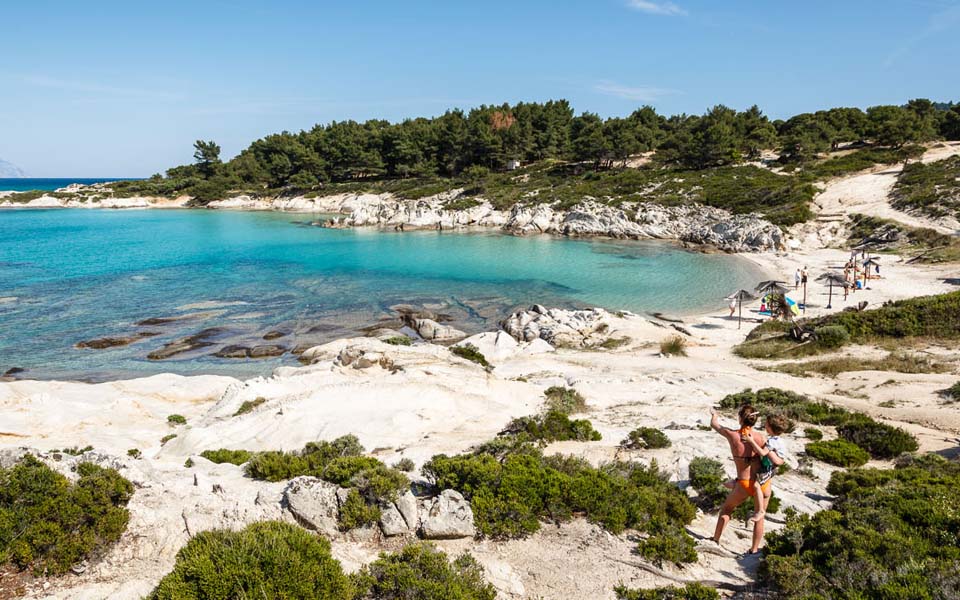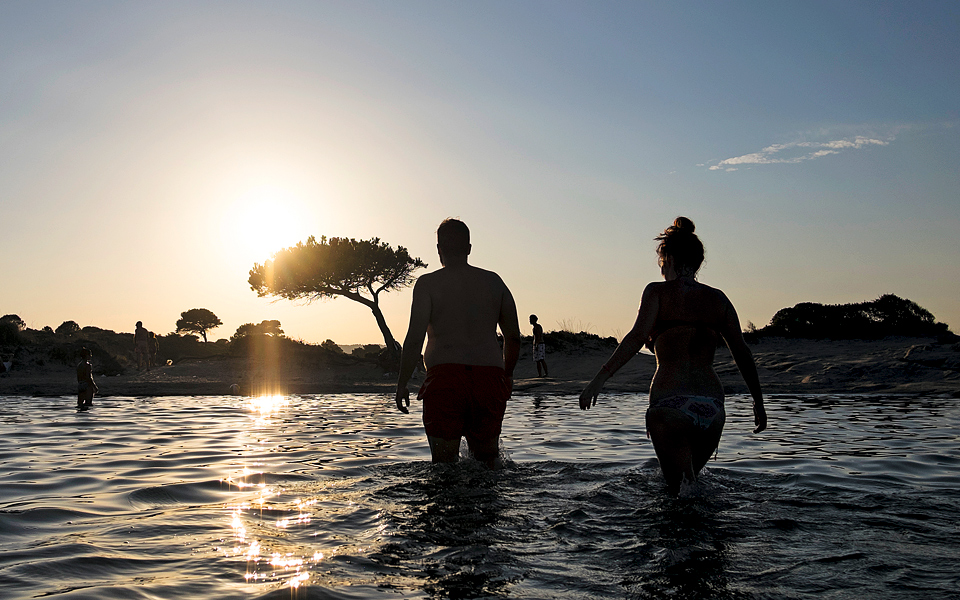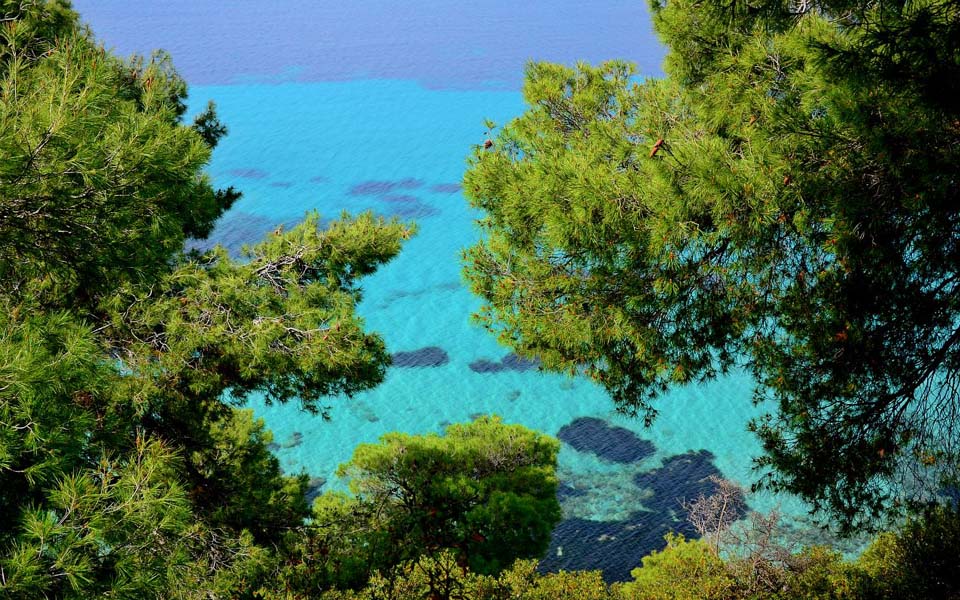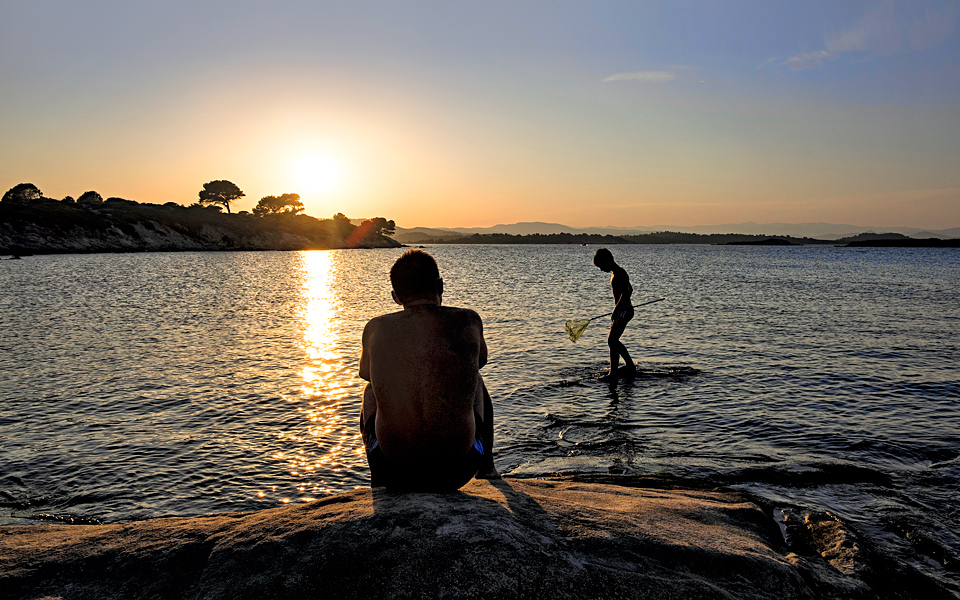There are several variations on the story I’m about to recount; I just happened to choose this version. A group of friends from Thessaloniki have just returned from a holiday at a glitzy Indian Ocean resort in Mauritius, and are out at dinner with other companions. Of course, the friends want to know all about the group’s experience at the resort. “We had a good time,” they all agree. “The sand on the beaches was golden, the sea was crystal clear, the hotel offered every luxury, the French restaurants were excellent and we had plenty of free time to play cards. It was really great… (small sigh) … but it was not Halkidiki.”
Now picture the same group in Heaven: “It’s really nice here,” one of them says. “Sure,” answers another one wistfully, “it’s very nice, but it’s not Halkidiki…” In a separate, slightly more real incident, I am swimming with my daughter at Bousoulas Beach, in Sani in Halkidiki. I ask her what her favorite beach is in Saint-Tropez, a place she visits every summer with her French mother. Without hesitation, she says it is Club 55. I insist that she makes a comparison between the two, disregarding for the moment just how the psychologists would frown on presenting a child with such a dilemma. She skillfully evades the question and, all of a sudden, I feel like one of the protagonists from my joke.
I have brought my daughter on a two-day holiday to this popular resort on Halkidiki’s first finger so that she can get in touch with the history of my forefathers. On my father’s side of the family, I hail from Polygyros, the capital of the peninsula of Halkidiki. According to my aunt, Kaity Zambouni, author of the book “Otan o Pappous Epiase to Molyvi” (When Grandfather Picked Up the Pencil), our family lived in this area for centuries, but they were forced to flee after one of my ancestors killed a Turk during the latter years of the Ottoman Empire. Fearing retribution, the family sailed by caique to the island of Skopelos, only to return later, once the incident had been forgotten.
“Sithonia rewards true seekers of authenticity by nature in its purest form, pine forests that plunge into the sea, the scent of wild thyme wafting like holy myrrh, the song of cicadas soaring like the Vienna Symphony.”

© Konstantinos Tsakalidis
The rest of the information I have regarding the family history is fragmentary. I do know, for example, that my great-great-great-grandfather Michalis fought in the Greek War of Independence that began in 1821, and that his son, Nicholas, was the only family member to survive a cholera epidemic a few years later. I know the family worked hard and eventually prospered. A hoe in their calloused hands turned wretched earth into fertile land.
In those days, anyone who cleared a forest claimed it as their own. Any olive trees they grafted became theirs. That’s how my ancestors acquired land. They were royalists and conservatives, and even gave Halkidiki two mayors; my grandfather and my great-grandfather. (That tradition was broken, at least as far as Halkidiki was concerned, when my father, for professional and ideological reasons, moved to the town of Veria, where, by sheer coincidence, he also ended up being elected mayor.)
We come now to the joyful year of 1960. My parents have just moved back to Polygyros after lengthy stays at medical school in Germany. My father is a cardiologist and my mother is a pediatrician. The “village,” as locals still refer to it – perhaps because it is the smallest regional capital in Greece in terms of population – holds little future for them. What do I mean by this? My father, because of his left-wing ideological beliefs, refuses to accept any money from his patients. My mother, pregnant with my humble self, needs to travel to Thessaloniki to give birth, as Polygyros has no maternity clinic.
Their choice is simple: either stay and suffer, or move and work and live unimpeded elsewhere. There’s something else that makes the choice somewhat easier; the village, like the rest of Greece, is divided in two, between the victors of the Civil War and those who were defeated. My father belongs to the latter category. Back in 1943, at the age of 15, he had joined the ranks of EPON, one of the resistance organizations fighting German occupations forces and, shortly afterward, became a member of the Greek Communist Party, which ran that organization. Because of his activities, he was arrested by the Gestapo and tortured, spared death only by my grandfather’s important connections.
“In those days, anyone who cleared a forest claimed it as their own. Any olive trees they grafted became theirs. That’s how my ancestors acquired land.”

© Konstantinos Tsakalidis
I feel this personal narrative is necessary to explain how our family came to be Halkidiki visitors rather than notable locals and why, at this point in the story, during my childhood years, our family lives in Veria but still spends most weekends in Halkidiki, traveling there in the trusty family car, a sturdy Renault 16. In winter, we stay at the 19th century three-story stone house – they call it a mansion today – on the main square of Polygyros. Summer breaks are spent at the cottage, also made of stone, at the beach in Gerakini. This building, now our summer home, was once a bunkhouse for the workers who gathered our olives. Apart from two or three humble homes belonging to fishermen, the cottage is the only structure on the beach. A bauxite mine mars, ever so slightly, what is still an idyllic view, but we just pretend not to see it. We are not alone for long.
The appearance of new neighbors comes gradually but methodically. The first big hotel makes its appearance in the early 1970s down at one end of the approximately kilometer-long stretch of sand. It is called Gerakina Beach. This is where I first try windsurfing and pedal-boating, where I practice foreign languages with every tribe of Israel, where I fall in love with tourists with the kind of enthusiasm that only teenagers can muster, and where I play spin-the-bottle with my peers on the moon-lit beach. This is where I pour my libations to the god Dionysus at the hotel discotheque to the pumping sounds of disco music, except, of course, on Greek nights, when we all dance syrtaki, waiters and tourists together, arms flung around each other.
“This is where I first try windsurfing and pedal-boating, where I practice foreign languages with every tribe of Israel, where I fall in love with tourists and where I play spin-the-bottle with my peers on the moon-lit beach.”

Tourism, both domestic and foreign, will define Halkidiki’s character in the years that follow. This blessed land will become the privileged satellite of Thessaloniki, the neighboring metropolis, the sine qua non summer holiday destination, a haven for all those who need a break from the city. Thessaloniki and Halkidiki will become interconnected vessels; when one empties, the other fills up. Suddenly, every self-respecting urbanite longs for a beachside villa, especially on the first finger, the one called Kassandra. It becomes so inundated that on some summer weekends it can take up to an hour to drive just a few kilometers. For the less well-to-do, contractors build complexes of small houses or apartments, while the really poor stay in tiny houses built illegally on whatever patch of land can be found.
Such unruly development soon affects most of the coastline and the true seekers of authenticity are sent in search of a new haven, either in the pristine highlands of Halkidiki or on the second, more remote finger, Sithonia. There, they are richly rewarded by nature in its purest form: pine forests that plunge into the sea, the scent of wild thyme wafting like holy myrrh, the song of cicadas soaring like the Vienna Symphony and, of course, the unmatched blue-green bathing waters, capable of making you want to stay in them forever, that surrounds all of Halkidiki.
One fine example of how this magic works is provided to me by my daughter who, as we finish our swim at Bousoulas, asks me in almost pleading tones whether we can remain in Halkidiki for another three or four days.
ABOUT THE AUTHOR | Christos Zambounis is a journalist who has written for numerous Greek and French magazines and newspapers. He is also a publisher and writer.
“Thessaloniki and Halkidiki will become interconnected vessels; when one empties the other fills up. Every self-respecting urbanite longs for a beachside villa, especially on the first leg.”












